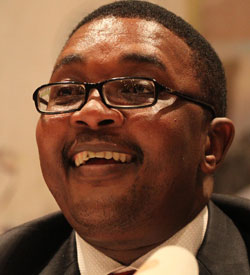
An article published by The Standard on July 24 2016 under the banner “the big interview” titled, “Protests: Mzembi breaks ranks”, and which was essentially a Question and Answer between me and senior reporter, Richard Chidza, has prompted me to follow it up with this installment.
SUNDAY OPINION BY WALTER MZEMBI
My assessment of the article was that, though I was quoted verbatim in the main body of the article, the essence of what I said was subtly misrepresented in the introduction, as well as by the context provided by the other image on the same page.
In the final analysis, the points I made were over-politicised and given a particular spin, within the context of our on-going politics. The misrepresentation arises from failure to emphasise the fact that I made the remarks from the perspective of Tourism minister.
The article ended up miscommunicating me and what I stand for ordinarily, and this, more damagingly so, after my endorsement, by the African Union, led by the government of Zimbabwe, as the continent’s sole candidate for the United Nations World Tourism Organisation secretary-general’s position.
As Cabinet, the executive arm of the government of Zimbabwe, we can, and, sometimes do, differ, or, if you like, “break ranks”. However, all of us are very clear that it is self-defeating to do so in the media.
From the very outset, following my appointment as Tourism minister, I have consistently viewed my brief as one where I encourage the use of “soft power”, as opposed to “hard power”, for the purpose of bringing conflicting parties to a common point of view. I have equally emphasised the massive strength of “constructive engagement” undoing gridlocks in human relations.
It is in this context that I was speaking when I commented on the national protests. Mine was, therefore, simply a plea for peace, tolerance and constructive engagement in the resolution of disputes in our country. The plea was on behalf of the tourism sector.
- Chamisa under fire over US$120K donation
- Mavhunga puts DeMbare into Chibuku quarterfinals
- Pension funds bet on Cabora Bassa oilfields
- Councils defy govt fire tender directive
Keep Reading
I have learnt a great deal regarding national, regional and international relations since my government, Sadc and Africa’s endorsement of my decision to throw my hat into the ring, and contest for the UNWTO secretary-general post.
My international engagements have, since then, seen me travel world-wide and attend all of the UNWTO’s regional commission statutory meetings: Africa (Cote d’ Voire April 19-21; the Americas (Havana May 1-5); Europe (Vilunus May 22-25); Asia and the Pacific (Nora, Japan June 2-4); Malaga, Spain May 9-11; WTTC (Dallas Texas April 4-8); China May 18-21; and Togo June 22.
My attendance at all these fora, together with the 80 or so bilateral meetings I have had with world leadership, have further strengthened my faith and belief in constructive engagement.
The real “stock holders” of Zimbabwe and its prevailing peace are none other than us, Zimbabweans.
Whatever way forward we take must be our own decision, because our welfare is, first and foremost, our business, and nobody else’s.
Recent world history clearly illustrates the folly of thinking otherwise.
In conclusion, on the issue of national protests, let me address the question of the use of our national flag in marches or demonstrations.
I will not mince my words on this one: I regard it improper and unethical for any individual person to appropriate the national flag as symbol for their own specific cause, no matter how noble.
The national flag, as a symbol of our being and nationhood, is sacrosanct, it belongs to all of us, collectively, at all times, for all time.
l Mzembi is the Tourism and Hospitality Industry minister











